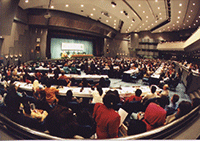Beyond Gender Mainstreaming
Volume 20, Issue 3, November 2012

The Plenary Hall during the UN Fourth World Conference on Women, Beijing 1995 Credit: UN/DP 051331/Zhang Yan Hui
Gender mainstreaming as an approach came out of the UN Fourth World Conference on Women held in Beijing, China, in 1995, where activists successfully lobbied the world’s governments to make a dramatic commitment to the way they approach gender justice and women’s rights. Today, many feel that gender mainstreaming has become anodyne, mechanical and depoliticised, and lacks the strength and revolutionary power to support women in poverty to respond to assaults on their rights at this time of complex crisis. This issue highlights the progress and the challenges of gender mainstreaming in international NGOs in widely varying contexts across the world, and the impact that this has had on the lives of women on the ground, their dependents and their communities.
In this issue, gender and development policymakers, practitioners, and feminist activists debate the progress of gender mainstreaming in development institutions and the state. The articles here come out of the Beyond Gender Mainstreaming Learning Project convened during 2011 and 2012 by Gender & Development and the UK Gender and Development Network – a network of UK-based international NGOs – which involved around 200 women and men from the global South and North.
Contents
Gender & Development is published by Routledge. If you are interested in subscribing to the journal, please visit the Routledge website. (Please note the reduced subscription rates available for low and middle income countries.)
For free access to the articles in the Beyond Gender Maintreaming issue, please visit the Publications section of the Oxfam Policy & Practice website, and search the site using the article title or author name.
You can access the Introduction, and the Resources and Book Reviews sections of the Beyond Gender Mainstreaming issue, free, below.
Editorial
Introduction: Beyond gender mainstreaming
Caroline Sweetman
Articles
Gender mainstreaming: recognising and building on progress. Views from the UK Gender and Development Network
Helen Derbyshire
‘It’s just been such a horrible experience.’ Perceptions of gender mainstreaming by practitioners in South African organisations
Jenevieve Mannell
Mainstreaming women’s safety in cities into gender-based policy and programmes
Caroline Moser
Looking through an equity and inclusion lens in Tanzania: the experience of WaterAid
Joyce Ndesamburo, Erin Flynn and Samantha French
The micro-politics of gender mainstreaming: the administration of policy in humanitarian work in Cambodia
Franz Wong
From the bottom up: lessons about gender mainstreaming in the Andes from Digni’s Women Empowerment and Gender Equality (WEGE) programme
Heidi Holt Zachariassen
Substantive Gender Mainstreaming and the missing middle: a view from Dutch Development agencies
Anouka van Eerdewijk and Ireen Dubel
‘…the donor community, they are not sensitised about these kind of gender things’: incorporating ‘gender’ into the work of a Ghanaian NGO
Hannah Warren
Fixing women or fixing the world? ‘Smart economics’, efficiency approaches and gender equality in development
Sylvia Chant and Caroline Sweetman
‘Measuring the unmeasurable’: gender mainstreaming and cultural change
Jeanette Kloosterman, Esther Benning and Rex Fyles
The elephant in the room and the dragons at the gate: strategising for gender equality in the 21st century
Joanne Sandler and Aruna Rao
Intersectional mainstreaming and Sightsavers’ Lady Health Workers Programme in Pakistan
Clara Fischer
Mainstreaming from Beijing to Ghana – the role of the women’s movement in Ghana
Diana Højlund Madsen
Better than the sum of our parts? Reflections on gender mainstreaming in a confederation
Shawna Wakefield
Resources
Beyond Gender Mainstreaming Resources List
Compiled by Liz Cooke
Views, events, and debates (not available online)
Edited by Liz Cooke
Book reviews
Edited by Liz Cooke
Men and Development: Politicizing Masculinities
Reviewed by Dean Peacock, Angelica Pino and Mark Weston
Harvesting Feminist Knowledge for Public Policy: Rebuilding Progress
Reviewed by Kristine Goulding
The New Maids: Transnational Women and the Care Economy
Reviewed by Deborah Eade
Transformative Policy for Poor Women: A New Feminist Framework
Reviewed by Naomi Hossain
The Women of Katrina: How Gender, Race, and Class Matter in an American Disaster
Reviewed by Sarah Bradshaw
